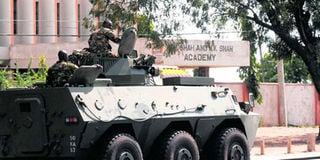Troops to pitch tent in Boni Forest until 2017

Kenya Defence Forces soldiers patrol Lamu. Officers on patrol escaped death on August 3, 2016 when a home-made bomb planted on a road exploded ahead of their convoy. A manhunt for the terrorists is under way. PHOTO | LABAN WALLOGA | NATION MEDIA GROUP
What you need to know:
- The initiative by the Kenya Defence Forces, police, National Intelligence Service and Interior ministry was launched on September 4, and was expected to last 90 days.
- Terrorists forced residents into mosques and preached radical teachings that propagate bloodshed and the creation of a caliphate similar to the Islamic State in Syria.
Operation Linda Boni, the combined effort by Kenyan security agencies to fight Al-Shabaab terrorists in counties on the Somalia border may be extended until 2017.
The initiative by the Kenya Defence Forces (KDF), police, National Intelligence Service and Interior ministry was launched on September 4 and was expected to last 90 days.
However, it could continue, following fears that the terrorists have retreated with the aim of returning once the forces are withdrawn.
Mr James ole Serieni, the operation’s director, said it would not end until the threat is completely eradicated.
“We have established eight camps that are manned by officers who shall remain there until the problem is fully dealt with. We are willing to stay here for as long as it takes. We are not putting timelines, whether it takes two years or more, we are here,” said Mr Serieni.
The operation is three-pronged. KDF soldiers are engaging in direct combat that involves aerial bombardments even as infantry soldiers comb the forest.
NIS agents have infiltrated neighbouring villages to secretly pick out those collaborating with the terrorists, while the police are interrogating those arrested, with the aim of charging them in court.
The Daily Nation toured the area last week with the escort of KDF Special Forces because it is still designated an “operational area” and, therefore, dangerous.
The area includes Mpeketoni, Hindi, Panda Nguo and Witu, where 84 people were killed in three days of incursions by Al-Shabaab last year.
Thereafter, the terrorists planted home-made explosives on main roads, causing more deaths. They exploded as vehicles ran over them.
In other instances, the terrorists invaded villages and hoisted their black flag with white Arabic writings.
SAVED BY KDF
They also forced residents into mosques and preached radical teachings that propagate bloodshed and the creation of a caliphate similar to the Islamic State in Syria.
Unlike on an earlier tour by the Nation in September, when residents opted to express their fears anonymously, this time around, they spoke openly against Al-Shabaab, describing the terrorists as “animals”.
An elder, Said Kuno said: “We as Bonis were left behind (by the rest of Kenya) and so these animals took advantage of this backwardness. Here, a woman gives birth on the roadside. Since Al-Shabaab came in, we left our homes and slept in the forests. Women spent nights in forests with children strapped on their backs. That changed after security forces moved in.”
The operation also made it easer for humanitarian organisations that could not dare venture into the area at the height of Al-Shabaab activity.
United States Agency for International Development (USaid) director John Smith-Sreen was in the area to launch projects to assist locals.
However, the Americans were not taking any chances as they moved around in an armoured military jeep, escorted by heavily armed US marines wearing bulletproof vests.
Mr Smith-Sreen spoke to elders at Hapa Hapa in Mukowe, a tiny township on the Lamu mainland.
“It is difficult to keep peace in a place where there is no development. That is why we are launching Tusome project in conjunction with the national government. It involves education at Standard One and Two because it is the foundation of growth for these children,” he said.
Restoration of peace in Lamu is at the heart of Kenya’s development because the county will be the home to the country’s biggest project, Lapsset, a multibillion-shilling initiative comprising a highway, a railway line, a seaport and an airport linking Ethiopia and landlocked South Sudan.
Following the operation, a Chinese contractor has moved to the ground and has started work on the project launched by President Kibaki on March 2, 2012.
Already, 1,000 houses for workers are being constructed and a ship from China is on the high seas carrying heavy construction equipment.
As part of Operation Linda Boni, nine police posts have been established in the area.




